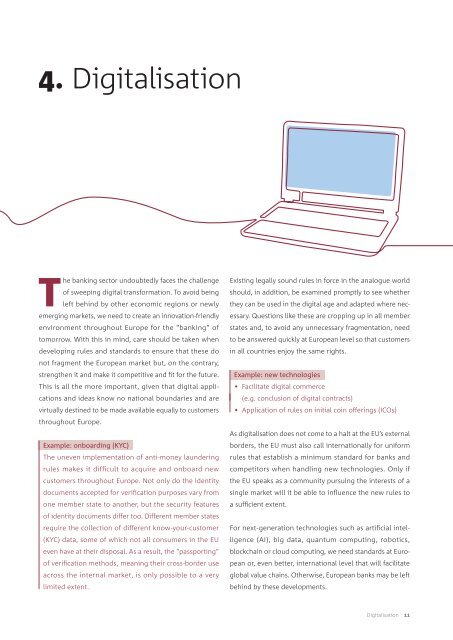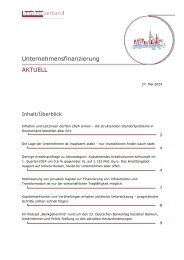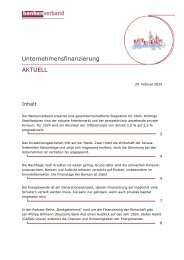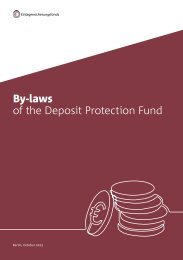Strong banks for a single European financial market
The last few years have seen the EU take its first steps towards establishing a single European financial market. But these aren`t yet enough! In the following pages, we outline measures that will help to create a single European market.
The last few years have seen the EU take its first steps towards establishing a single European financial market. But these aren`t yet enough! In the following pages, we outline measures that will help to create a single European market.
You also want an ePaper? Increase the reach of your titles
YUMPU automatically turns print PDFs into web optimized ePapers that Google loves.
4. Digitalisation<br />
The banking sector undoubtedly faces the challenge<br />
of sweeping digital trans<strong>for</strong>mation. To avoid being<br />
left behind by other economic regions or newly<br />
emerging <strong>market</strong>s, we need to create an innovation-friendly<br />
environment throughout Europe <strong>for</strong> the “banking” of<br />
tomorrow. With this in mind, care should be taken when<br />
developing rules and standards to ensure that these do<br />
not fragment the <strong>European</strong> <strong>market</strong> but, on the contrary,<br />
strengthen it and make it competitive and fit <strong>for</strong> the future.<br />
This is all the more important, given that digital applications<br />
and ideas know no national boundaries and are<br />
virtually destined to be made available equally to customers<br />
throughout Europe.<br />
Example: onboarding (KYC)<br />
The uneven implementation of anti-money laundering<br />
rules makes it difficult to acquire and onboard new<br />
customers throughout Europe. Not only do the identity<br />
documents accepted <strong>for</strong> verification purposes vary from<br />
one member state to another, but the security features<br />
of identity documents differ too. Different member states<br />
require the collection of different know-your-customer<br />
(KYC) data, some of which not all consumers in the EU<br />
even have at their disposal. As a result, the “passporting”<br />
of verification methods, meaning their cross-border use<br />
across the internal <strong>market</strong>, is only possible to a very<br />
limited extent.<br />
Existing legally sound rules in <strong>for</strong>ce in the analogue world<br />
should, in addition, be examined promptly to see whether<br />
they can be used in the digital age and adapted where necessary.<br />
Questions like these are cropping up in all member<br />
states and, to avoid any unnecessary fragmentation, need<br />
to be answered quickly at <strong>European</strong> level so that customers<br />
in all countries enjoy the same rights.<br />
Example: new technologies<br />
• Facilitate digital commerce<br />
(e.g. conclusion of digital contracts)<br />
• Application of rules on initial coin offerings (ICOs)<br />
As digitalisation does not come to a halt at the EU’s external<br />
borders, the EU must also call internationally <strong>for</strong> uni<strong>for</strong>m<br />
rules that establish a minimum standard <strong>for</strong> <strong>banks</strong> and<br />
competitors when handling new technologies. Only if<br />
the EU speaks as a community pursuing the interests of a<br />
<strong>single</strong> <strong>market</strong> will it be able to influence the new rules to<br />
a sufficient extent.<br />
For next-generation technologies such as artificial intelligence<br />
(AI), big data, quantum computing, robotics,<br />
blockchain or cloud computing, we need standards at <strong>European</strong><br />
or, even better, international level that will facilitate<br />
global value chains. Otherwise, <strong>European</strong> <strong>banks</strong> may be left<br />
behind by these developments.<br />
Digitalisation


















